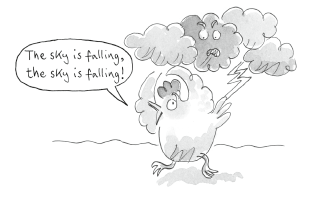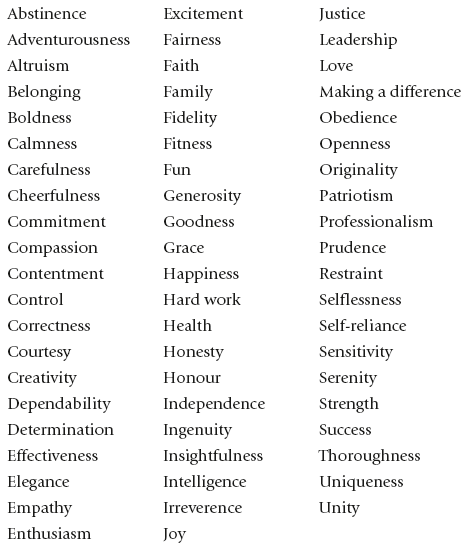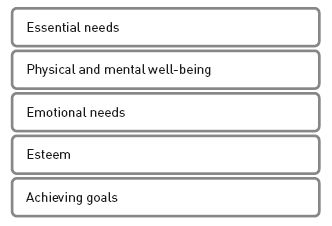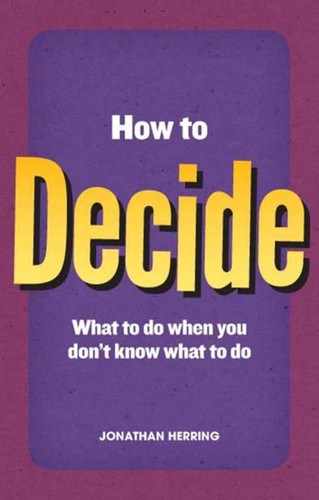You want to make excellent decisions; the problem is that it’s easy to be influenced without realising it. You need to be aware of the natural tendencies that we all have which can take our decision making off course. Equally, there are factors that should influence your decision making that you can easily ignore. It is important to think about this right at the start.

What should not drive decisions
So what are the things that might drive our decisions, but shouldn’t?
Fear or lack of fear
One of the things that many people find hardest to deal with is risk. This keeps a lot of people from making decisions. We should acknowledge that for many people an irrational bias can take over when it comes to risks. Consider these two people:
- AMY: If I go outside I might be hit by lightning and so it is safest to stay inside.
- BRINDA: I am so good at driving that even if I drive at 100mph I can drive safely.
Amy has placed far too much weight on the risk of being hit by lightning. So much so that it is ruining her life. Quite literally, she needs to get out more! Indeed, tragically, she may be putting herself more at risk by staying inside (and not getting exercise or having friends) than by going out.
Brinda, on the other hand, has greatly overestimated his driving ability when speeding. He is endangering his life and the lives of others because he is confident that the statistics don’t apply to him. This is a common problem, when individuals think they are outside the law and perfectly safe in what they are doing, and is a selfish and inconsiderate way to approach life.
Look back on your life and think about whether you are the kind of person who is always terrified of risk or is happy-go-lucky. You don’t need to change, but do try to be aware of your natural inclination and make sure it does not lead you to make irrational decisions. If you are naturally cautious that’s fine, but make sure you are not being absurdly so. Similarly, if you are naturally a risk-taker, that’s not a problem, but be careful that you keep risks to a reasonable level.
When considering statistics in relation to risk it is important to keep a clear head. Here are some key points in understanding statistics:
- Virtually everything has a risk; we wouldn’t get out of bed in the morning if we were trying to avoid all risk of harm. In fact, come to think of it, we wouldn’t stay in bed either – what if the ceiling fell in? So just because you can see a possible bad consequence for a decision does not mean you should not do it. Everything has a risk.
- Assess the risk. How likely is it to happen? Imagine doing the thing 100 times – how often would the bad result occur? Amy should imagine going outside the house 100 times; how often would there be a lightning strike? Zero. That means it is a negligible risk. However, if you drive at 100mph how likely is it that there will be an accident or you will get caught by the police? 50 times out of 100? Maybe more. It is therefore a much higher risk.
So many people make the mistake of making a decision on the basis of hoping to avoid a (dubious) disaster, rather than because it will move them towards something wonderful. Don’t miss out on the best for fear of the worst.
- Consider not just the likelihood, but also how bad the thing you are risking is. It may be worth taking a fairly high risk of a small harm. Travelling on public transport carries a risk of catching a cold in winter. Most people think the risk is worth it if it is easier going to work on public transport and getting a cold is perceived as not too bad. However, it is high risks of disasters that you want to avoid at all costs. If your house is burning down, it is best not to go in to get anything!
- Are the risks inevitable or can you reduce them? Driving a car carries a risk; this can be reduced by wearing a seatbelt and driving carefully. You also should have insurance, which will cover the risk of an accident should one occur. If you are worried about booking a holiday because you might fall ill, travel insurance won’t reduce that risk but it will help you in the event that it does happen. If you are thinking of embarking on a new relationship and are worried it will not work out, perhaps you should make sure you have a network of friends who will support you if it goes wrong. In any situation ask yourself, do you have an alternative? If things go wrong, do you have alternatives that are nearly as good? And is there any way you can reduce your risk?
Acknowledge the pressures
Sometimes we feel under pressure from others about a decision. Your girlfriend very much wants to get married and she will be very upset if you say no. Your business partner is very keen to pursue a venture and will be disappointed if you do not agree. You have been offered a job and you know your parents will be thrilled if you accept.
It is, in fact, almost impossible to make a decision without feeling under pressure from somewhere or someone. The key point is that this is your decision. You will have to live with the consequences of the decision, not your parents or friends. Never make a decision just on the basis that you are doing what someone else wants you to do – it’s not a good reason to do it. So be aware of the expectations and hopes of others, and take them into account, but make sure you do not skew your decision making just to please them. Remember you are the one who is making the decision and you will be responsible for it.
Other people may disagree with your decision and may be disappointed in you, but having gone through the processes in this book you will be able to justify your decision. You are not being wilful or selfish or petulant; you have thought through the issues available and used sensible decision-making techniques to arrive at the best result.
Are you in the right mood?
In 450 BC Herodotus made the following statement:
‘If an important decision is to be made [the Persians] discuss the question when they are drunk and the following day the master of the house … submits their decision for reconsideration when they are sober. If they still approve it, it is adopted; if not, it is abandoned. Conversely, any decision they make when they are sober is reconsidered afterwards when they are drunk.’
I’m not sure I would recommend that approach but it shows that decisions can only be made if we are ready to make them. Sometimes we are in an emergency and a decision has to be made – there is no time to lose – so at the end of this book there is a chapter on making decisions in a hurry. However, in other instances, if the decision is important it needs to be made with care and you will need time and a calm mind to make it.
Above all do not make a decision when you are angry. An angry decision is likely to be one caught up in the moment. It is unlikely to be thought through. I am sure we have all said or done things in anger that we deeply regret. Good decision-making needs a cool head, not a hot one.
Similarly, make sure you are in a steady mood. It is easy to make a rash decision when you are feeling very happy, which is why some firms try to sell property to people on holiday. They know holidaymakers are having a good time and are excited about being in a new place and so they will probably have their guards down. Be wary about making a major decision when you are deliriously happy, for you are looking at the world through very tinted spectacles!
The same is true if you are feeling down. When everything is grey and you can see only gloom you will not be able to assess the reality of your situation. You need a realistic look on the world if you are to make a good decision. If possible, wait until you are feeling more equitable.
That said, avoiding decision making is a disaster. Too often people are waiting for things to change but are not making a decision about how to change things. Usually change just does not happen. If things are not as you would like them to be you need to make a decision to change them. Beware of thinking that you will ‘wait and see’ – there may be some occasions in which that is sensible, but too often that is an excuse not to recognise there is a problem. It is a way of avoiding making a decision about what to do.
For many people worry is a real barrier to making a decision. It might even stop them thinking about the decision they are to make. Don’t worry – you can do something about this. A problem faced is better than one that eats away at you. Don’t worry, but take action. Although you may be nervous about making decisions, in this book you will find the tools to make an excellent decision. Taking it step by step will help you to make a decision that is logical and justified.

Remember this, too: for many decisions there is no one right answer. What outfit to wear or whether to buy new shoes can cause worry and sometimes terror (‘what will people think?’), but your decision is unlikely to result in a disaster. Or perhaps you choose to go on holiday to Greece and have a great time. You would probably have had a great time if you went to Italy instead. There is not necessarily a right answer to lots of everyday decisions, and once we recognise that, the agony can be taken out of decision making.
What should influence you?
Decisions are not just based on facts, although those are important, they are also about values – what matters to you. This is why I can’t make decisions for you, nor you for me – we’re each unique in how we see the world around us. We all have different beliefs and we all want different things out of life.
And that’s important when it comes to making decisions. The kind of person you are, the values that underpin your life, and your core beliefs will, and should, influence what decisions you make.
A common error in decision-making is for a person to make a decision while forgetting their values. They are later riven with guilt because they made a decision they are embarrassed about or which they later decide was morally wrong. You don’t want to do that. So, although I’m sure you’re eager to get on to the ‘how to make the actual decision’ part, it’s well worth taking a minute to remind yourself of what matters to you.
Values
Values are the things that are most important to you – the rules you live your life by; your moral guideposts. I can’t tell you what your moral values should be, that’s a matter for you, but you need to be clear about what yours are. For most people these turn on two key questions:
- What are your absolute moral principles? Most people have certain things that they would never do, or would never do unless there was an exceptionally good reason for it. Virtuous people will insist we should never lie, not even ‘white lies’, while others believe that lies are justified if they achieve a greater good. You might think there is a difference between lying to a friend and lying to a business client. You might believe that promises must never be broken or that adultery is always wrong.
If you have moral principles of this kind, be clear about what you believe. Apply your principles to the decision you are trying to make. Do any of your moral principles come into play here?
If you do have a strong moral principle, stick to it. Moral principles are only of value if you hold fast to them when there are persuasive reasons not to. If you are only honest when someone is looking, you cannot really claim to be honest. If you are only faithful to your partner when there is no strong temptation not to be, you cannot really claim to be faithful.
It may be that you’re not sure what the moral thing to do is. In that case you can’t go far wrong by using the principle ‘treat others as you would like to be treated yourself’.
- What are your goals? What are you looking for in life? You need to view the decision against the backdrop of both your values and where you are heading in life. If you are trying to decide whether or not to cancel a dull commitment so you can go on a fun day out instead, you need to know if you are ultimately seeking instant gratification or a virtuous character. If you’re trying to decide whether to leave your job and retrain in another role you need to think about whether your driving value in this situation is more money or a deeper sense of job satisfaction. If you’re not sure, think about which of the options has made you more happy in the past – when you’ve felt most content and fulfilled – or what you’d like to be remembered for. You might love watching DVDs, but in the end will you look back with pride at the fact that you watched over 10,000 DVDs during your life?
So your values will include these absolute moral principles and also what you are looking for in life. Some people may feel a bit uncomfortable with all this talk of morals and values, but these don’t have to be anything high-minded. You may decide that the key value for you in a particular decision is making money. That is, of course, common. Most people when purchasing something will be seeking to get value for money, and most people when making business decisions are seeking the deal that will achieve the most profit.
It might help to have a look at these words below: which four would you most like to have associated with your life, and how might that desire affect the decision you need to make?

When thinking about your values you might want to distinguish between your central values and your fun values. Most of us have things we enjoy doing – watching a particular TV series, cooking on a BBQ – but these are not what ‘make us us’. They do not represent defining characteristics. Not many people when asked ‘What kind of person are you?’ would say, ‘I am a TV watcher’! Fun values are different from our central values: these might be religious, an ethical code, a political belief, or support for a football team! Central values would be how you define yourself: what you see as an integral principle for you. Thinking through this might help you decide whether things you enjoy are actually central to your identity or are in fact rather more superficial values – while these may still be important, they are less so than the central values. Knowing your central values can certainly aid you in the decision-making process.
One final point: remember your values may change during your life. You may once have been religious but now have lost your faith, or you may have found a new faith. In younger days having fun may have been a priority, but now establishing family life is paramount. This does not mean that the values you had at the time were wrong, it is just that for some people values change. Certainly don’t assume that the values you once had are necessarily the ones you still hold dear. That said, those who have strong moral values will often hold them throughout their lives.
Be self-aware
As part of being self-aware, let’s explore some of the common differences people will bring to their decision making:
- Risk-averse; risk-takers. We have already seen on p.18 that there are those who avoid risks like the plague and those who seem to revel in risk, who are confident that bad things will never happen to them. Which are you?
- Do you rely on thoughts or feelings? There are those who focus on rational thought and have no regard for emotions or gut feelings. There are others who much prefer dealing with matters by instinct. Most people use a combination of rational judgement and intuition, but are likely to have a preference for one or the other.
- Do you prioritise yourself, your family or your community? Some people make decisions based on what is best for them, others place much more weight on the interests of others. Are you the kind of person who typically thinks about others and is willing to help others, even if it is inconvenient to you? Altruism is, if you like, the opposite of selfishness. Altruism puts others first, whereas selfishness puts the self first. Of course, few people are purely altruistic, and few people are purely selfish – most people are somewhere between the two. But where you are can affect how you weigh up the different factors when making decisions. The more altruistic you are, or wish to be, the more weight you will place on the interests of other people. But be careful: considering only others and not yourself could end up meaning you become so miserable you are no help to anyone. You must look after yourself and protect your health and well-being, even if that does sometimes mean other people must come second.
- Do you seek perfection or is ‘good enough’ sufficient? Are you determined to achieve the ideal in what you do or are you happy if things are good enough for the job? Depending on your outlook, your decisions will certainly reflect this characteristic. Your opinion can make group decisions more difficult, as some people are happy for a good enough result while others require the perfect solution.
- Do you find you are often complaining, or do you hate grumbling? Some people are highly conflict-adverse; they hate the idea of upsetting someone or having to complain about something. They will pay the restaurant bill even if the food was awful. They will say nothing to the employee who is always phoning in sick, rather than put in disciplinary proceedings. However, by contrast some people are much more forthright and do not shy away from any kind of confrontation or disagreement.
- Do you tend to prefer the familiar or the new? Many people have a preference for the familiar, which is why they go to the same place on holiday each year. If it is very important to you that you do not make a mistake, choosing the familiar may be sensible. If you are organising your mother’s 80th birthday you may prefer a venue you are familiar with over one you are not. Conversely, some people always prefer something new and relish exploring unknown terrain. Knowing which personality you are will guide your decision making.
- Are you a person who is influenced by appearance? This is a common divide among people. For some appearance is just frippery; who cares what someone is wearing when what matters is their character, their views, what they are like and what they do? To them spending time on appearance is a waste and highly irrelevant – they just grab the nearest shirt and jeans and move on to the important business of life. This trait normally extends to other areas, too. Why worry whether the car is clean or dirty as long as it goes? The cover and appearance of the report is irrelevant, it is the content that is key.
For others appearance is crucial: they believe that you need to look decent to be taken seriously. If you cannot take the time to make your appearance smart you are reflecting a slovenly, lazy attitude to life. If your report is not easy on the eye and is untidy, to them that suggests the thinking in it is untidy too. To people who value appearance, smartness and neatness is an outward mark of an inner reality.
The difficulty is that both sides can have a dim view of the other. To the ‘anti-appearance’ brigade the ‘pro-appearance’ lobby appear fixated on the trivial; while the pro-appearance brigade see the anti-appearance lobby to be untidy and inconsiderate.
In listing these factors I do not suggest that one side is good or the other bad, but that you should make sure you know yourself. Do you tend to be selfless and put little weight on your own interests? If so, be careful in your decision making that you are not downplaying your own interests too much. Do you tend to seek perfection? Have you ignored a good-enough option that might be the best? If you know your own biases you don’t need to change them, but at least be aware of how they have influenced your decision and so be willing to explain why you decided the way you did.
Know your needs
It may help when thinking about personal decisions to consider carefully your different needs. Here is one way of thinking about them:

Your basic needs are your essential biological needs: what you need to live. Water, food, health care and so forth. These are the most important needs you have. Unless the situation is completely dire you should never make a decision which leaves you without these.
Next there are safety needs: you must protect your physical and mental well-being. Without a healthy emotional and physical life you will not be able to help others or function well in society. People who are very altruistic and put the interests of others way above their own interests risk endangering their own well-being to such an extent they are no help to others and in fact become a burden. As with basic needs, unless you are facing a desperate situation do not make a decision which risks causing you serious mental or physical harm.
The next thing to think about are emotional needs: having a sense of belonging, a place within society, and of loving and being loved. These are central to a person’s emotional well-being; they are important in making a person feel content.
Understanding your emotional needs leads naturally on to the next in the list, esteem: the need to feel valued both by others and oneself. Many studies have been done which show that having a good self-esteem helps in all parts of life, and in our case, decision making. Valuing yourself and your opinions, as well as feeling valued and listened to, is an important need that should not be disregarded.
Finally, self-actualisation looks at reaching the things that give you a sense of achievement and purpose. These needs include fulfilling your plans and feeling successful. Self-actualisation means realising your potential, and if unmet these needs can lead to much unhappiness. However, sometimes our sense of belonging and the commitments we have might mean we cannot satisfy all our plans. We can’t meet all our self-actualisation needs. For example, our role as a parent might mean that we cannot pursue a particular business venture. Understanding our self-actualisation needs, and knowing when it is possible to meet them and when they have to be postponed, is a great help in decision making.
When making a decision that will affect your personal life you could consider how the decision will affect all these different needs that you have. It is also useful to rank your needs to see which are really integral to you.
Summary
After reading this chapter you should have a clearer sense of who you are and what matters to you. An understanding of these factors is crucial in making an excellent decision. Be aware of your tendencies and the pressures that you face – they might set you off on the wrong course. Don’t be misled by your own preconceptions or pressures from others. Before embarking on the decision-making process, try to work out possible dangers:
- Do you tend to avoid risk at all costs or do you enjoy the thrill of risk-taking?
- Do you feel under pressure from others to make a decision in a particular way?
- Are you in the right mood to make a decision?
You will not necessarily be able to remove all these influences, but if you are aware of them you can make sure they do not have undue significance in your decision. Instead, be clear on what you hold dear. Make sure you act in line with your principles, values and goals. Then you can make a decision which is the right one for you.
